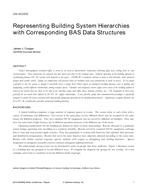Nonparametric tests are used to determine trends of drybulb temperature, dew-point temperature, and wet-bulb temperature for stations listed in the tables of climatic design conditions in the 2013 ASHRAE Handbook – Fundamentals (ASHRAE 2013). The tests are robust and straightforward to implement, are utilized with yearly averages as well as yearly minima and maxima, and are applied both to individual stations and to 5° x 5° cells containing in general more than one station. They show that trends are difficult to detect for individual stations, but are more easily seen in cells; in general the more stations a cell contains the greater the likelihood to detect a trend. Of all cells, 44% show an increase in average dry-bulb temperature and 2% show a decrease; 26% show an increase in average dew-point temperature and 10% show a decrease; and, finally, 34% show an increase in average wetbulb temperature while 5% show a decrease. Increases in drybulb temperature are typically in the range 0.2°C to 0.6°C/ decade (0.36°F to 1.08°F/decade) and are spread throughout Europe, China and southeast Asia, the eastern United States, and southern Australia. Northern locations exhibit higher trends (above 1°C/decade [1.8°F/decade]). Dew-point temperature increases are most visible in Eastern Europe, while decreases are experienced in the southern United States and South America.
Citation: ASHRAE Transactions – Volume 120, Part 2, Seattle, WA
Product Details
- Published:
- 2014
- Number of Pages:
- 13
- File Size:
- 1 file , 7 MB
- Product Code(s):
- D-SE-14-011

